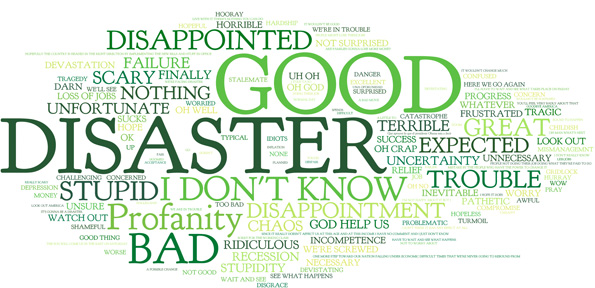WASHINGTON, D.C. -- Americans are much more likely to use negative words or phrases -- including "bad," "disaster," and "God help us" -- than positive ones to describe their views on the federal government budget sequester.
![What word would come to your mind if the budget sequester takes place on Friday as planned? [OPEN-ENDED]](http://content.gallup.com/origin/gallupinc/GallupSpaces/Production/Cms/POLL/doobh0g2duofsrqcijm4yg.gif)
These responses are from an open-ended question Gallup asked Americans on Feb. 25-26, as politicians and the media heightened their focus on the automatic budget cuts set to take place on Friday, March 1 at midnight.
The 44% giving a negative response is similar to the 45% of Americans who told Gallup in the same survey that they want their representative in Congress to vote to avert the cuts. And the 35% who give a neutral or a positive response aligns with the 37% who favored letting the budget sequestration go into effect as scheduled.
Americans offer a wide variety of words and phrases in describing what comes to mind if the budget sequestration takes place. "Bad" is the most frequently mentioned negative word, at 5%, and "good" the most frequently used positive word, at 4%. After these two, Americans were most likely to say "disaster," "God help us," "hopeful," "trouble," "disappointed," and "stupid." No other words or phrases received more than 1% of mentions.

Read all the words Americans used to describe their reaction to the sequestration.
![What word would come to your mind if the budget sequester takes place on Friday as planned? [OPEN-ENDED] February 2012 results](http://content.gallup.com/origin/gallupinc/GallupSpaces/Production/Cms/POLL/xr8gi_aiiegpfd21dwcq8q.gif)
Bottom Line
Americans' open-ended reactions to the $85 billion in budget sequestration cuts set to go into effect at midnight Friday are far more likely to be negative than positive. This finding lines up with Gallup's survey showing that more Americans want to avoid the cuts than let them take effect and that a majority say sequestration will harm the U.S. economy.
At this point, a deal to avert the cuts is highly unlikely. Once sequestration happens, the government has warned, furloughs will start to take place, public programs will see cuts, and government hiring freezes will go into effect. While it is unclear just how immediate the impact of these changes will be, over time, if unaddressed, they may begin to disrupt the U.S. economy as a whole. Gallup will track how the sequester affects Americans -- their political views, confidence in the economy, spending, and so on -- in the days and weeks ahead. However, Americans' negative reactions to sequestration may compel Congress and the president to act sooner rather than later to undo the situation.
Survey Methods
Results for this Gallup poll are based on telephone interviews conducted Feb. 25-26, 2013, on the Gallup Daily tracking survey, with a random sample of 1,017 adults, aged 18 and older, living in all 50 U.S. states and the District of Columbia.
For results based on the total sample of national adults, one can say with 95% confidence that the margin of sampling error is ±4 percentage points.
Interviews are conducted with respondents on landline telephones and cellular phones, with interviews conducted in Spanish for respondents who are primarily Spanish-speaking. Each sample of national adults includes a minimum quota of 50% cellphone respondents and 50% landline respondents, with additional minimum quotas by region. Landline telephone numbers are chosen at random among listed telephone numbers. Cellphones numbers are selected using random digit dial methods. Landline respondents are chosen at random within each household on the basis of which member had the most recent birthday.
Samples are weighted to correct for unequal selection probability, nonresponse, and double coverage of landline and cell users in the two sampling frames. They are also weighted to match the national demographics of gender, age, race, Hispanic ethnicity, education, region, population density, and phone status (cellphone only/landline only/both, cellphone mostly, and having an unlisted landline number). Demographic weighting targets are based on the March 2012 Current Population Survey figures for the aged 18 and older U.S. population. Phone status targets are based on the July-December 2011 National Health Interview Survey. Population density targets are based on the 2010 census. All reported margins of sampling error include the computed design effects for weighting.
In addition to sampling error, question wording and practical difficulties in conducting surveys can introduce error or bias into the findings of public opinion polls.
For more details on Gallup's polling methodology, visit www.gallup.com.
